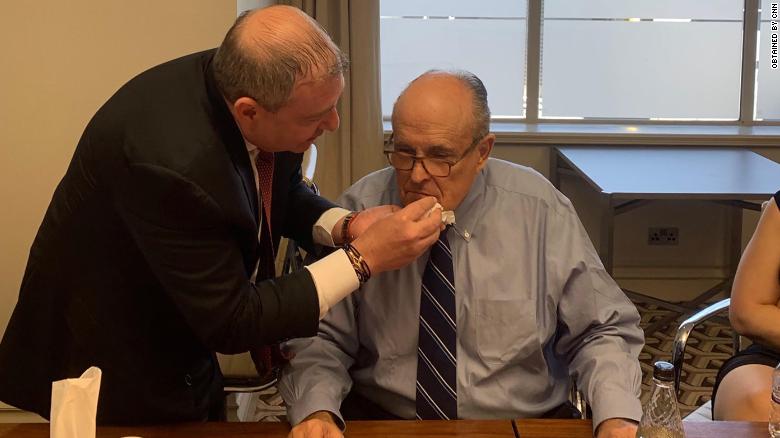The Venomous Epstein Tapes
Ghislaine Maxwell and I crossed paths soon after I moved to New York in 1997.
Though she was a few years older than me, we were both English, Oxbridge-educated and would sometimes be invited to the same parties. She was pin-thin, expensively dressed, funny, fun, clever, worldly and the effortless centre of attention.
She talked about sex a lot — and she liked to behave outrageously. During one Manhattan dinner I heard about, she told a British movie star to lie face-down on the floor; she jumped on his back and gave him a massage right there on the ground in front of everyone. Even as people laughed, one observer wondered if what she was doing was not inappropriate.
Usually, she was by herself. I had no idea whether or not she had a boyfriend.
But then, in the autumn of 2002, I was assigned to write an article for Vanity Fair magazine about an intriguing and very rich man called Jeffrey Epstein. I soon discovered that Ghislaine had had a complicated relationship with Epstein for over a decade.
They didn’t live together, I was told. Some sources claimed she worked for him — although Epstein later denied this. He insisted they were not romantically involved, instead telling me she was his best friend.
What struck me as strange was that at the start of my reporting I’d bumped into Ghislaine at a friend’s baby shower: and when I mentioned I was writing the article, she started to cry.
At the time I put it down to how unequal their relationship seemed. I’d heard she loved him and he did not love her back.
She wanted to marry him and have children, sources told me — though she had insisted otherwise. Meanwhile, he wanted to stay single and sleep with (many) other women, which he certainly did.
And Ghislaine, according to the sources, put up with this — they presumed because Epstein could provide her with the same lavish lifestyle she’d grown up with as the daughter of the late and crooked media mogul Robert Maxwell.
After his bizarre death in 1991, Robert’s children (two of whom were accused but cleared of aiding their father’s crime) were left — at least officially — more or less penniless. So, Epstein looked after Ghislaine financially, in return for her introducing him to the glitterati. That was the mythology.
But when I toured Epstein’s house in 2002, 11 years after Robert Maxwell’s death, there were photos everywhere of another ex-girlfriend, former Miss Sweden Ava Andersson Dubin — but none that I saw of his ‘best friend’ Ghislaine.
I asked him about this and he brushed it aside, saying there were ‘lots of photos of lots of people’ in the house.
My 2002 article was on Epstein’s money. No one knew how he’d become so rich: he lived in what was said to be Manhattan’s biggest private townhouse, a nine-storey mansion.
He had a huge ranch in New Mexico, an island in the Caribbean and his own Boeing 727 — on which he had recently flown Bill Clinton to Africa.
Adding to the mystery, he rarely went out. It was said, instead, that wealthy and powerful people came to him — he claimed to manage the fortunes of billionaires.
Our numerous phone calls as we arranged the interview — which was to be off-the-record, meaning I couldn’t quote him — had shown me I was dealing with a mercurial control freak.
And he was true to form. He made a point of eating the sandwiches laid out for his ‘tea’, one by one, without offering me anything, despite the fact I was pregnant.
He had also left out a copy of a lurid book by the notorious French libertine the Marquis de Sade for me to notice on his desk.
We spoke for some time, and I left. Afterwards, weirdly, his assistant phoned me to tell me he’d thought I was ‘pretty’. A messenger delivered a book to me at my home address: ‘Maths For Dummies’. (I’d told Epstein I hadn’t studied maths since I was 14.)
I was creeped out: I hadn’t given him my home address — Vanity Fair’s was easy enough to find — and the flattery was crass.
Then, even more uncomfortably, he began to bombard me with phone calls. These went on daily for months. From their tone — alternately smarmy and bullying — I knew he was hiding something. I just didn’t know what.
He wasn’t remotely charming or funny. He was deeply misogynistic: from a terrible joke about his desire to see his female staff only wearing Prada bikinis in his New York house, even in winter, to telling me he enjoyed being surrounded by women because he liked ‘elegant things’.
Mostly, though, he was a thug, who soon told me he had compiled a dossier on my then-husband and me. He claimed that he could get my husband fired from his job, and me from mine.
He continually threatened to sue me personally, which, he reminded me, he knew I couldn’t afford. Strangest of all, he threatened to put a ‘hex’ — a demonic spell — on my unborn children.
This crossed all normal boundaries — and it became an obsession for him. He wanted to know who my doctor was, where the babies would be delivered. And he warned me: ‘I know all the doctors in this town.’
Because of the threats, I recorded him, on the advice of my lawyer. The transcripts of these conversations run to some 450 pages.
Now you will be able to hear parts of these, re-enacted by actors (sadly, I lost the micro-cassettes years ago) in my podcast Chasing Ghislaine, released on Audible next week. This is executive-produced with bestselling writer James Patterson, and we have also filmed a documentary series to be released by Discovery Plus later this year.
Now, of course, Epstein is dead: he was found hanged in his New York federal jail cell in 2019 in circumstances that continue to trouble conspiracy theorists.
Ghislaine, his alleged accomplice, is awaiting trial for sex trafficking and other offences, and faces up to 80 years behind bars if found guilty. She denies all the charges.
And in light of the appalling alleged crimes, particularly those committed against children, that this pair have been accused of — and, in some cases, of which Epstein was found guilty — my conversations with the man are all the more chilling.
What you hear in them is a master manipulator at work: someone with many secrets to hide.
In 2002, for example, Epstein told me rich people don’t go to the authorities when their money is stolen: they just want it back. Now I know what he meant.
I have discovered while preparing the podcast that, for 30 years, Epstein was embroiled in a shady underworld involving international espionage, blackmail, money-laundering and smuggling guns, diamonds and drugs.
He boasted that he was a ‘hyper-fixer’: someone who could move between different countries and cultures, exchanging information, but mostly making money through shadowy deals.
But, perhaps inevitably, what most fixated him during his talks with me were ‘the girls’.
Again and again, he asked me: ‘What about the girls? What have you got on the girls?’ The answer, I know today, was ‘not enough’.
One woman who’d been to dinner at Epstein’s house described the event to me as being like Eyes Wide Shut, the 1999 film starring Tom Cruise and Nicole Kidman and featuring a debauched mass orgy.
There were parties, I heard, where Epstein and Maxwell cavorted with rich older men — among foreign women who looked much younger.
Now I know that, at the same time Epstein was demanding of me ‘what about the girls?’ he was raping 15-year-old Jennifer Araoz, a beautiful child from the poorer New York borough of Queens.
Jennifer’s harrowing testimony and its devastating impact on her life are revealed in our podcast: she now runs a foundation, Survivors Initiative, to help girls like her.
For my Vanity Fair article, I did find two sisters, Annie and Marie Farmer. Separately, each told me that Epstein had sexually abused both of them, Annie when she was just 15. I believed them and I wanted to publish their story, but to my dismay, the sisters’ allegations did not make into my Vanity Fair article.
The magazine’s editor, Graydon Carter, says that he and the publication’s lawyers didn’t believe my reporting was sufficient, even though I maintain we had three sources supporting their allegations. (Carter has denied this.)
Troublingly, however, I have an email from December 2002 — just before the story was due to be published — from a colleague at Vanity Fair that reads: ‘Bless you — guess who just appeared in Graydon’s office? Jeffrey Epstein.’
It is, to say the least, highly unusual for the subject of an investigative magazine article to appear in the offices of the outlet profiling them — and perhaps especially in the editor’s office.
Did the impeccably well-connected Epstein put pressure on the magazine to drop any hint of the sexual abuse I had uncovered about him? I don’t know.
But there is no doubt Epstein was rattled by my forthcoming article. In one of our last and most unpleasant exchanges, he snarled that we had reached the point where this was no longer about a journalist and the subject of a magazine profile, it was about me and him: it was, he said, ‘personal’.
His threats to my unborn children had affected me, and when I subsequently gave birth to twin boys, they were two months premature. I believe the stress of dealing with Epstein led to the premature births, and as they remained in the neonatal intensive care unit for weeks, then months, it was hard to forget his ugly threat to have a witchdoctor cast a spell on them.
As for Ghislaine?
Writing my magazine article, I was told by reliable sources that she was hopelessly in Epstein’s thrall.
Stuart Pivar, a New York society art dealer and a former friend of Epstein’s, told me that Epstein appointed him to watch over Ghislaine in the days after Robert Maxwell mysteriously fell to his death from his yacht in 1991.
Pivar said Epstein told him to make sure Ghislaine ‘made it through this dark period’. But it was difficult to match the glittering social queen Ghislaine seemed at Manhattan parties with the woman described by the Farmer sisters, ‘pathetic’ in her emotional and financial dependency on Epstein, who treated her with disdain.
Annie told me Ghislaine had given her a topless massage when she was 16 — below the age of consent in America. Maria claimed Ghislaine had pretended to be asleep and held her hand while Jeffrey groped her one night in Ohio.
I had to put these allegations to Ghislaine in a deeply unpleasant phone call. She denied everything. She was furious.
And after the article ran — without, luckily for Maxwell and Epstein, the Farmers’ allegations — I hoped never I’d never see the pair of them again.
But Ghislaine and I were to cross paths again a few more times.
We ran into each other a few years later in New York. This time, she had a new boyfriend, Ted Waitt. He had founded a computer hardware company and made a fortune. They’d met through Bill Clinton and now she boasted about flying helicopters and piloting a submarine that was attached to Ted’s yacht, as well as the philanthropic work she was doing, saving the oceans.
She didn’t mention Jeffrey Epstein — and why would she? In 2009, he had been jailed for 18 months for solicitation of a prostitute and a minor in Palm Beach, Florida. Much of New York society had decided that he was a creep — though they didn’t know that a U.S. Attorney, no less, had shut down a far more serious federal investigation into his crimes.
That might have been the end of the story. But in 2011, a photograph, taken in Ghislaine’s London townhouse, emerged. It showed a young girl, Virginia Roberts, standing with Prince Andrew with his arm pulled around her waist as Ghislaine smiled beside them.
Roberts claimed that when she was 17 Epstein and Maxwell had ‘pimped her out’ to Prince Andrew. In subsequent years Ghislaine has denied this.
In 2011, the year that photograph emerged, Maxwell and Waitt separated. I last glimpsed Ghislaine in 2014 at a book party, but I don’t recall talking to her. That was one of the last events many of her friends remember seeing her at in New York.
In 2015, after leaving Vanity Fair, I finally wrote a piece about the Farmers with the sisters’ help, published in the Daily Beast. This laid out their claims of what had been done to them in the 1990s.
I’ve no idea what Ghislaine thought of that article. But the following year, 2016, I received a call — the number was withheld — and answered.
It was Ghislaine. She asked if I knew that I was on the witness list for Virginia Roberts Giuffre, who was then suing her for defamation.
A spokesperson for Ghislaine had called Virginia a liar.
I was surprised by the call. I hadn’t met Virginia, though I would later interview her.
But I couldn’t get off the phone quick enough. Journalists don’t want to be dragged into people’s private legal actions. Our job is to report and to protect our sources.
Ghislaine left New York in 2016, I discovered. But in 2019 she emailed me out of the blue, asking to meet for coffee.
This was in the wake of allegations that Epstein had received an unduly lenient sentence in Florida — allegedly perverting justice for dozens of his victims.
I sensed that she wanted to see me for litigation purposes, so I did not reply to her note.
Since her incarceration a year ago, she has become perhaps the most hated woman in the world. People find the idea of a woman allegedly abusing other women — children, even — worse than if a man does it.
And Ghislaine isn’t just any woman. She’s educated, born into immense privilege, with an extraordinary contacts book.
But there are still many questions about her. Even those who thought they knew her well are in the dark about the true nature of her relationship with Epstein — and what they may or may not have done together.
Still others — particularly certain very rich, very powerful men — fear that, even from the grave, Epstein could yet bring them down.
Chasing Ghislaine is an Audible Original podcast released on July 15. audible.com/ghislaine


